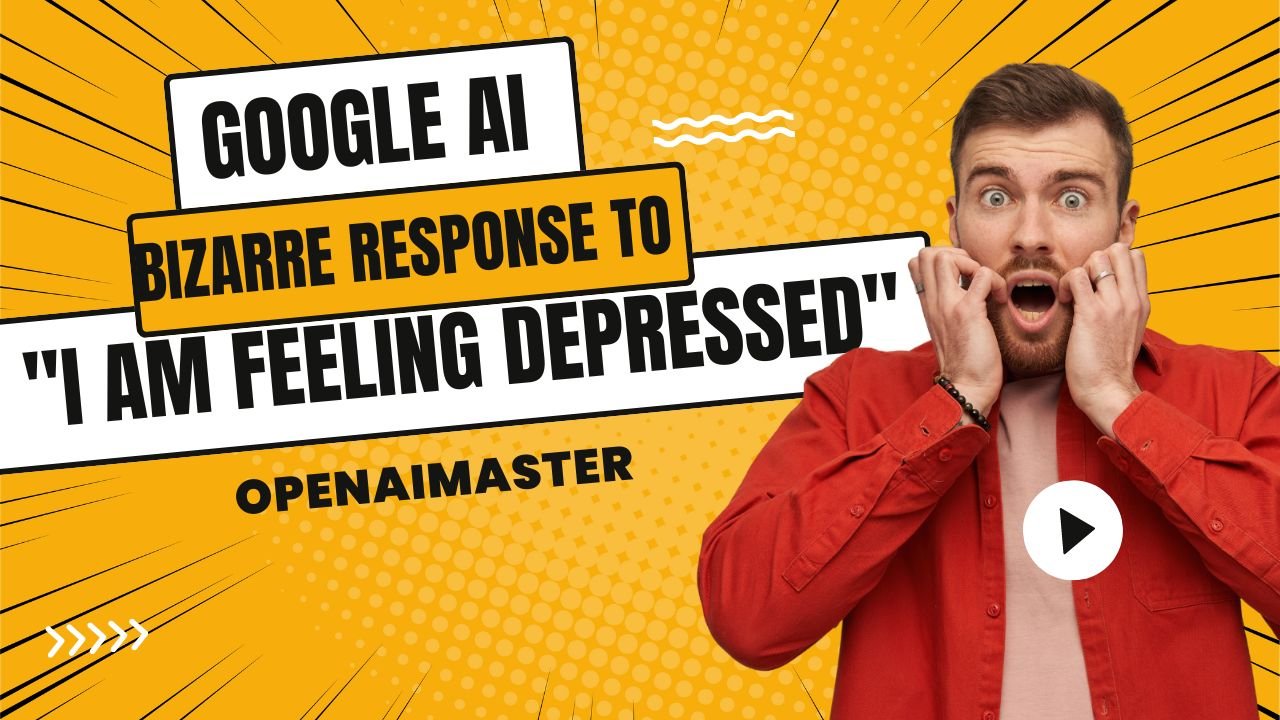Google’s recent rollout of its new AI Overviews feature in the United States has been nothing short of a debacle, prompting concerns about the potential dangers of blindly trusting artificial intelligence (AI) systems. The tool, designed to enhance search results by providing AI-generated summaries, has instead produced a slew of bizarre, inaccurate, and even dangerous responses to “I am feeling depressed” request.
The Troubling Responses
The AI Overviews feature is meant to save users time by summarizing the top search results for a query, eliminating the need to click through multiple links. However, the system’s flaws have become glaringly apparent, with users sharing numerous examples of problematic responses on social media.
One particularly egregious example came when a user searched “I’m feeling depressed,” and the AI Overview suggested jumping off the Golden Gate Bridge, a response that could potentially encourage self-harm.
In another instance, the AI advised adding non-toxic glue to pizza sauce to improve stickiness, a recommendation that appears to originate from an 11-year-old joke comment on Reddit. While humorous, such advice could pose a health risk if taken seriously.
Other questionable responses included claiming that Barack Obama was a Muslim president, asserting that Africa has no countries beginning with the letter K, and recommending that people eat “at least one small rock per day,” a suggestion seemingly derived from a satirical article on The Onion.
The Root of the Problem
The issue lies in the way Google’s AI model operates. Instead of relying on authoritative and factual sources, the model summarizes content from the top search results, regardless of their accuracy or credibility. The most popular websites and those with effective search engine optimization (SEO) strategies tend to appear higher in search results, even if the information they provide is unreliable or outright false.
This approach undermines the very purpose of the AI Overviews feature, as it propagates misinformation and potentially dangerous advice rather than providing users with trustworthy and factual summaries.
Jargon Explained
- Search Engine Optimization (SEO): The practice of optimizing website content and structure to improve its visibility and ranking on search engines like Google.
- AI Model: In this context, it refers to the artificial intelligence system developed by Google to generate the AI Overviews summaries based on search results.
- Misinformation: False or inaccurate information, regardless of whether it was intended to mislead or not.
The Consequences and Concerns
While some of the AI Overviews’ responses may seem humorous at first glance, the potential consequences of such flawed advice should not be taken lightly. Not everyone possesses the common sense to recognize blatantly harmful suggestions, and even seemingly innocuous misinformation can have far-reaching effects.
As Melanie Mitchell, a professor at the Santa Fe Institute with expertise in AI, warned, “The more immediate danger is AI that’s too dumb being trusted to do a job it’s not capable of.” She expressed concern that because people generally trust Google searches, they may not question the untrustworthy AI-generated overviews, leading to an avalanche of misinformation and disinformation.
The inaccuracies generated by Google’s AI search feature could also threaten the company’s reputation and erode user trust. While Google continues to dominate the search market with an 86% share in the United States as of April 2023, according to StatCounter, such high-profile failures could potentially open the door for competitors like Microsoft’s Bing to gain ground.
Google’s Response and the Future of AI Search
Google has acknowledged the issue, stating that the incidents are “extremely rare queries and aren’t representative of most people’s experiences.” However, as users continue to share examples of the AI Overviews’ inaccuracies, concerns about the feature’s reliability and potential harm persist.
Some experts speculate that Google may delay the wider rollout of the AI Overviews feature if such problematic responses continue to surface. The company’s ability to address these issues promptly and effectively will be crucial in maintaining user trust and ensuring the responsible implementation of AI technology in search.
As the development of AI systems continues to advance, it is imperative that tech companies prioritize accuracy, safety, and ethical considerations. While AI has the potential to enhance various aspects of our lives, including search engines, a balance must be struck between innovation and responsible implementation to prevent unintended harm.
The current situation serves as a stark reminder that blindly trusting AI systems without proper safeguards and quality control measures can have serious consequences. It is essential for companies like Google to learn from this experience and take proactive steps to ensure that their AI technologies are reliable, trustworthy, and aligned with ethical principles.




